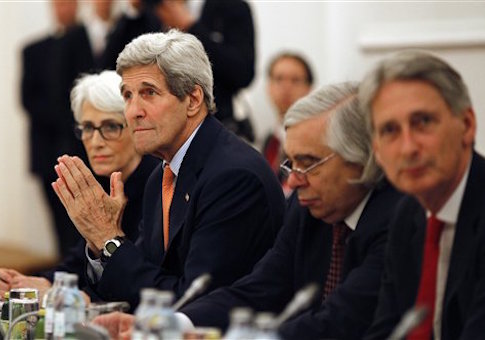VIENNA—As Iran talks stretch more than a week past a self-imposed deadline of June 30, U.S. officials hinted on Wednesday that the negotiations could continue past a third deadline of July 10.
Talks between world powers and Iran over its contested nuclear program were originally scheduled to conclude on June 30. Before that deadline, U.S. and Iranian officials publicly declared that the sides were closer than ever to striking a deal.
However, the mood between the sides has darkened throughout the week, with each side avoiding reporters and issuing few public statements.
U.S. officials on the ground also have begun emphasizing that the administration is prepared to walk away from the talks without reaching an agreement.
After blowing past the first June 30 deadline, talks were extended to July 7 and then July 10. Now U.S. officials are hinting that this current deadline will not be met.
The Iranians, on the other hand, have issued statements through their state-controlled media pressuring world powers to give in to the Islamic Republic’s demands regarding sanctions relief and the ability to continue building hardware such as ballistic missiles.
One senior U.S. official who briefed reporters in Vienna on Tuesday warned that the talks could end in a stalemate.
"Quite frankly, I’m astonished by the speculation in the press about the likelihood of getting to an agreement soon," the official told reporters. "I just put that down to the fact that you all would like to go home."
While some critics have described to the administration’s public rhetoric as phony, State Department Spokesman Mark Toner said on Wednesday that the talks may stretch past their third deadline.
"We're still intent on trying to reach a deal over the next 48 hours, and that's where the focus remains," Toner told reporters. "From that point, we'll assess what additional steps need to be taken."
"You know, we've talked a lot about deadlines," Toner added. "You know, they're motivational factors and can help drive the negotiations forward, but what we've said throughout is if we need to negotiate further, we will, and they—the goal here is a good deal, not—not meeting some deadline."
If talks extend beyond July 10, Congress would be given a 60-day—rather than a 30-day—review period to assess the deal.
Toner insisted that the administration would not ink a bad agreement.
"We would rather walk away than not get the best agreement we possibly can that prohibits a nuclear weapon or Iran from acquiring a nuclear weapon," he said.
